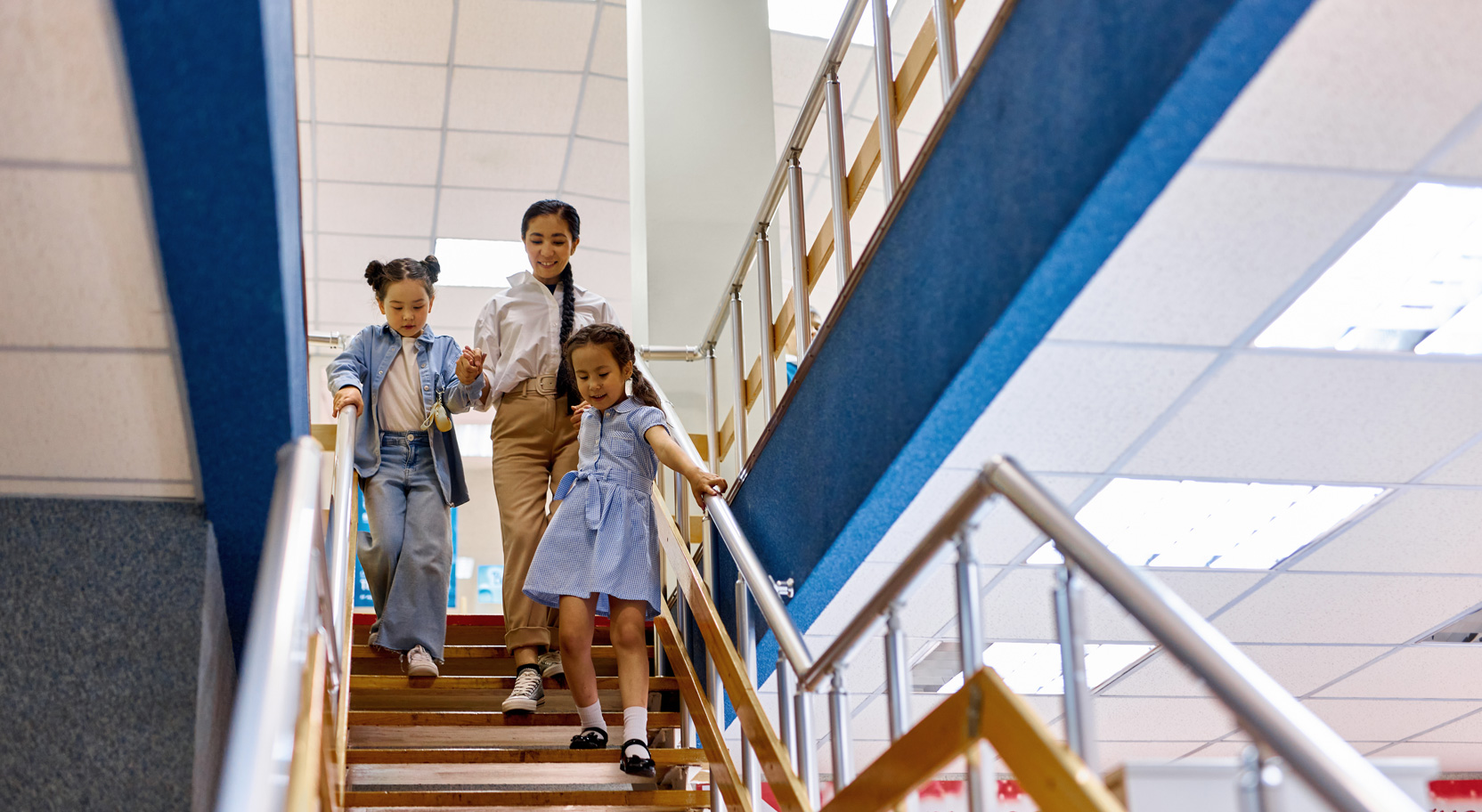





The Primary School Programme is designed for students aged 3 to 10 (11) years and is based on the basic regulations of the International Baccalaureate Primary Years Programme (IB PYP) and the Kazakhstani educational standards for primary level education. The basis of learning and teaching at Primary Level Education is an inquiry activity, in the process of which a child conceives the world around him/her through looking for answers to questions and acquires new experiences by using gained knowledge in real life public welfare and the surrounding world.
A prominent feature of Primary Level Education at Miras International School is an inquiry approach to learning embedded in the International Baccalaureate Primary Years Programme.
The inquiry is based on six key questions – transdisciplinary themes, around which a structured cognitive activity of younger students is organized within the framework of the Programme of Inquiry:

According to the International Baccalaureate recommendations for Primary Level Education, the curriculum for pre-school upbringing and education is structured and divided into six educational areas: ‘Languages’, ‘Mathematics’, ‘Social studies’, ‘Art’, ‘Personal and social development’, which entail all strands of organized educational activity that are the part of the State Compulsory Educational Standards of pre-school education of the Republic of Kazakhstan.
Each educational area includes a cycle of subjects that contribute to the inclusion of pre-school student to panhuman values, all-round development, formation and development of social and general educational skills.
The learning activity of children during the day is planned in blocks corresponding to the following educational areas:
‘Language’ educational area is represented by Kazakh, English and Russian, which corresponds to multilingualism – the basis of the educational model of the school and pre-school and is focused on early development of language competence and communication skills of the students. The area includes learning objectives on development of speech, fiction, fundamentals of literacy and drama.
‘Mathematics’ educational area entails the following types of educational activity: formation of elementary mathematical representations, development of sensorics and constructing.
‘Social studies’ educational area is aimed at formation of ideas on diversity of cultural and historical specifics of different public and social groups in preschoolers; acquaintance with customs and rituals of the Kazakh people and peoples who live on the territory of Kazakhstan; promoting tolerance and general behavioral norms in society.
‘Science’ educational area is aimed at the acquaintance of the children with natural phenomena and special features of animate and inanimate nature through organized search-and-cognitive activity, which in its turn, is focused on formation of basic skills of natural inquiry in the preschoolers.
‘Art’ educational area is represented by the following list of educational disciplines: Music, Choreography, V-Art (painting, sculpting, applique) and is aimed at formation of creative skills and aesthetic perception of the world in the preschoolers.
‘Personal and social development’ educational area is represented by the educational programmes on physical education, self-cognition and PSPE (personal, social, physical education), which is implemented through all types of organized curricular and extracurricular activity of the preschoolers within the whole framework of child’s attendance of the Pre-school.
Curriculum implementation is carried out through organized search-and-cognitive activity of the children within the framework of the Programme of Inquiry, which is based off six transdisciplinary themes.
The classes at Pre-school for all the training courses are organized in compliance with integrated educational programmes, based on the recommendations of subject guides for Primary Level of education (IB PYP) and Kazakhstani programmes on upbringing and education designed for students of pre-school age.

A distinctive feature of the Primary school educational programme is the research approach to learning inherent in the International Baccalaureate programme for the initial stage of education. In accordance with the transdisciplinary research programme, throughout all the years of study in primary school, through the study of various problems (research topics) within the framework of each of the key questions, a natural cognitive process is built based on the natural curiosity of a younger student. During each school year, Primary school students explore one topic under each question. As a rule, the research topic raises questions from a variety of subject areas and passes the main idea through all lessons, therefore such an organization of educational and cognitive activities is possible only if a group of teachers working in this class work together and is reflected in the curriculum in all subjects.
A special feature of the Primary School educational programme is the focus on the development of approaches to learning skills in students, which include:
Exchanging information - listening, interpreting and speaking
Literacy - reading, writing and using language to gather and communicate information
ICT – communicating using technology to gather, investigate and share information
Interpersonal relationships, social and emotional intelligence
Developing positive interpersonal relationships and collaboration
Critical thinking - analysing and evaluating issues and ideas, and making decisions
Creative thinking - generating novel ideas and considering new perspectives
Information transfer - using skills and knowledge in multiple contexts
Reflection and metacognition - using thinking skills to reflect on the process of learning
Information literacy – formulating and planning, data gathering and recording, synthesizing and interpreting, evaluating and communicating
Media literacy - Interacting with media to use and create ideas and information
Ethical use of media/information – understanding and applying social and ethical technology
Organization – managing time and tasks effectively
States of mind – using strategies that manage state of mind
The culmination and the final stage of education in Primary School is an exhibition of individual and group projects of the students, during which students are provided with the opportunity to demonstrate personal knowledge and abilities and skills acquired in the Primary School in all academic subjects, actively demonstrating International Baccalaureate Learner Profile’s attributes.